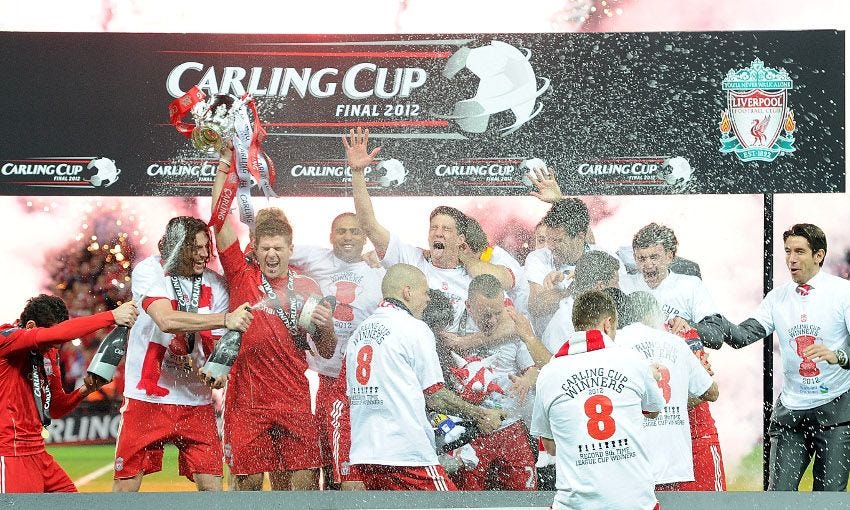Part 17 - A Quarter of a Century of Liverpool FC in the Premier League Era, 1992-2017
Turmoil and Cup Finals.
The Suarez-Evra incident that had dominated football news - in fact news full-stop - for weeks - resurfaced with the non-handshake betweeen the two at Old Trafford. Amidst all the fume, Liverpool also had Wembley to think about…twice.
Originally written by TTT Subscriber Anthony Stanley, this major series was first serialised on The Tomkins Times and then published by TTT as a book, called A BANQUET WITHOUT WINE - A Quarter-Century of Liverpool FC in the Premier League Era.
Covering the period from the onset of the Premier League in 1992 to Klopp’s arrival in 2017, the book is available from https://www.amazon.co.uk/Banquet-Without-Wine-Quarter-Century-Liverpool/dp/1521850674. It remains a definitive matter of record of Liverpool FC during the period in question.
It was as if the match – and the resulting fracas – cast a belligerent curse on the football club and the remainder of the season.
Two weeks after the Reds had knocked Manchester United out of the FA Cup, the great northern rivals met again in the league at Old Trafford in what was Luis Suárez’s return from suspension, after being found guilty of racially abusing Patrice Evra. After the Uruguayan decided not to shake Evra’s hand, the contest itself almost became an afterthought. The Times put it succinctly:
“That a game – and a result – of such significance as far as the championship is concerned could get quite so lost amid the rancour and recriminations that flowed in the wake of Suárez’s refusal to shake Evra’s hand served to underline just how raw a nerve this sorry saga has touched. Match of the Day felt inclined to show three replays of the handshake that never was but not one of any of the three goals…”
Luis Suárez was now firmly cast as the pantomime villain of English football.
It was in October, during what initially appeared to be a fairly insignificant incident, that the die had originally been cast. This is not a commentary on the legal status of the FA’s verdict, or the veracity of the case brought against the Liverpool striker. He was found guilty, fined £40,000 and banned for eight games. To this day, Suárez pleads his innocence and, in his recent autobiography, claimed that the incident placed ‘a stain on my character that will probably be there forever.’
But the whole regretful situation also placed a strain on the manager.
There can be little doubt about it; Kenny Dalglish’s interviews became more pugnacious as he bristled in front of the cameras. Always taciturn and reluctant with the media, the Scot, to a degree left on his own to deal with a mess not of his making, became palpably affected by having to deal with issues unrelated to football on a constant basis. The case itself was damaging to the club, the aftermath more damaging still. In Suárez’s final game before he began his suspension, the players endeavoured to show solidarity with their team mate by wearing tee shirts with his image and name emblazoned on the front. It should be noted here that the verdict was never completely cut and dry and the official line from the club was that, even though they wished to ‘stamp out racism in every form, inside and outside the club,’ they had a ‘strongly held conviction that the Football Association and the panel it selected constructed a highly subjective case … based on an accusation that was ultimately unsubstantiated.’
The rest of this article can only be read by Dynasty Subscribers. Hit the button if you would like to join us reliving Liverpool’s past and getting to know the club’s rich history.
Keep reading with a 7-day free trial
Subscribe to Dynasty – The Tomkins Times to keep reading this post and get 7 days of free access to the full post archives.




